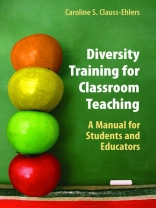Acknowledgements Section 1. Foundations 3 Chapter 1. Introduction: How to Use this Manual.. ………………. Chapter 2. How Do We Understand Difference?. …………………. 17 Section 2. Dimensions of Difference: Culture, Socioeconomic Status, Race, Ethnicity, Language, and Parental Partnership 29 Chapter 3. Cultural Values and Worldview.. ………………………. Chapter 4. Socioeconomic Status.. ………………………………… 4 1 …………………………………….. 5 1 Chapter 5. Race and Ethnicity.. Chapter 6. Language in the Classroom.. ……………………………. 67 Chapter 7. Working with Diverse Families: Parental Partnership in Education.. …………………………………. 8 1 viii Table of Contents Section 3 . Dimensions of Difference: Gender Chapter 8 . Gender …………………………………………………… Chapter 9 . Sexual Orientation and Youth …………………………… Section 4 . Other Challenges to Diversity Chapter 10 . Bullying in Schools ……………………………………… Chapter 1 1 . Creating Community through Classroom Management .. Chapter 12 . Child Abuse and Resilience ……………………………. Section 5 . Understanding Exceptional Microcultures Chapter 13 . Exceptional Microcultures: Dealing with Trauma …… Chapter 14 . Exceptional Microcultures: Youth with Emotional Disturbance- Childhood Depression. Eating Disorders ……………… Chapter 15 . Exceptional Microcultures: How to Make a Referral .. Section 6 . Conclusion Chapter 16 . Conclusion: The Multicultural Educator ……………… Selected Bibliography ……………………………………………… Glossary of Terms ………………………………………………….. Appendix A .Sample Course Syllabus ……………………………… Appendix B . Educational Intervention Proposal Paper …………….. Index …………………………………………………………………. Diversity Training for Classroom Teaching: A Manual for Students and Educators is an excellent guide for preparing responsive teachers, capable of exploring the roots of a wide variety of types of diversity and acting with knowledge and sensitivity to improve student learning and self-efficacy.
สารบัญ
Foundations.- Introduction: How to Use this Manual.- How Do We Understand Difference?.- Dimensions of Difference: Culture, Socioeconomic Status, Race, Ethnicity, Language, and Parental Partnership.- Cultural Values and Worldview.- Socioeconomic Status.- Race and Ethnicity.- Language in the Classroom.- Working with Diverse Families: Parental Partnership in Education.- Dimensions of Difference: Gender.- Gender.- Sexual Orientation and Youth.- Other Challenges to Diversity.- Bullying in Schools.- Creating Community through Classroom Management.- Child Abuse and Resilience.- Understanding Exceptional Microcultures.- Exceptional Microcultures: Dealing with Trauma.- Exceptional Microcultures: Youth with Emotional Disturbance-Childhood Depression, Eating Disorders.- Exceptional Microcultures: How to Make a Referral.- Conclusion.- Conclusion: The Multicultural Educator.
เกี่ยวกับผู้แต่ง
‘As a bilingual counseling psychologist and a media correspondent, ‘ says Caroline S. Clauss-Ehlers, ‘my interest lies in what helps children and families be resilient in the face of adversity and go on to live happy, productive lives. I am particularly interested in work with families from diverse linguistic and cultural backgrounds.’ Dr. Caroline S. Clauss-Ehlers (aka CC) is a nationally known counseling psychologist who trained at Teacher College, Columbia University and the NYU-Bellevue Hospital Center. She is currently an assistant professor of counseling psychology at the Graduate School of Education, Rutgers, The State University of New Jersey. Since 2002 she has been a columnist for the Chicago Tribune’s Spanish-language newspaper HOY (Newsday in Spanish) and writes the Nueva Edad (New Age) column that is published in the New York metropolitan area, Chicago, and Los Angeles. Since 2002 she has been a regular guest correspondent on Univision, appearing on their programs Al Despertar and Despierta America. She is a former talk show host at 1380 AM in New York, New York. Dr. Clauss-Ehlers is a 2004-2005 Rosalynn Carter Fellow for Mental Health Journalism with a project focused on the stigma of mental illnesses in the Latino community. She has conducted numerous presentations for print and broadcast media that include Child magazine, Eyewitness News, Redbook, the Herald News, and Channel Thirteen’s Women’s Health Night. She is an Advisory Board member of the Pampers Parenting Institute and a consultant for various organizations. Dr. Clauss-Ehlers has published numerous academic articles and has lectured internationally at venues such as the Universidad Nacional Autónoma de México, the 27th Inter-American Congress of Psychology in Caracas, Venezuela, the Second World Mental Health Congress in London, England, and the Korea-U.S. Joint Symposium on Anti-Stigma in Seoul, Korea. She has a private practice in Manhattan.Dr. Clauss-Ehlersreceived her bachelor’s degree from Oberlin College in Ohio and her Ph.D. in counseling psychology from Teachers College, Columbia University. Her recent books include being co-editor of Community Planning to Foster Resilience in Children (Kluwer Academic Publishers, 2004) and Diversity Training for Classroom Teaching: A Manual for Students and Educators (Springer, 2006). She is listed in the 2006 editions of Who’s Who in America and Who’s Who in American Education.Dr. Clauss-Ehlers lives in New York, New York with her husband and their two daughters, ages two-and-a- half years and 4 months.












